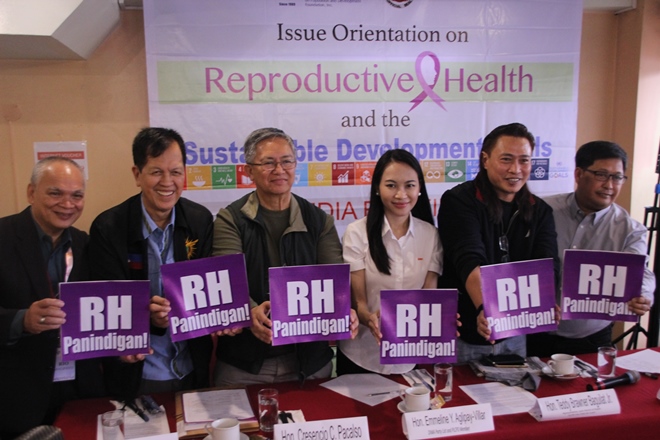LGU support crucial in RH, SDGs – PLCPD
“We can no longer allow mothers to die of pregnancy and child birth-related complications, and let young women be robbed of their childhood and a bright future when they become mothers at a young age—especially when these situations are preventable, and especially at a time when we have a national law that mandates the provision of a full range of services that will help prevent exactly these. Local government units are the frontliners and thus play a crucial role in ensuring the full implementation of the law,” said DIWA Party List Representative and Philippine Legislators’ Committee on Population and Development (PLCPD) member Emmeline Y. Aglipay-Villar during an issue orientation on Reproductive Health (RH) and Sustainable Development Goals (SDGs) with the media and other concerned stakeholders held in Baguio City today.
PLCPD explained that while progressive legislation such as the Magna Carta on Women and the Responsible Parenthood and Reproductive Health (RPRH) Law have already been passed, the reproductive health situation of Filipinos, especially the poor women and the young, remains a daunting challenge. While the enactment of RPRH Law is a significant gain, challenges get in the way of its full implementation.
Just last year, Congress defunded the budget for purchase of family planning supplies by 1 billion pesos during. Meanwhile, the Supreme Court’s Temporary Restraining Order (TRO) on public procurement and distribution of Implanon, a family planning commodity popular among women, and the impending expiration of the certification of many other products pose a challenge for the Department of Health to pursue a serious family planning program. Family planning is one of the elements of reproductive health. Local government units have also reported difficulties in implementing the RPRH Law, especially in providing funding and the required human resource.
“This situation underscores the need to strengthen the commitment of policymakers to defend RH and capacitate stakeholders to pursue the implementation of the law as well as the achievement of the SDGs, particularly at the local level”, explained PLCPD executive Director Romeo Dongeto.
The Philippines did not meet its Millennium Development Goal (MDG) target of reducing maternal mortality ratio to 52 deaths per 100,000 live births. As of 2013, there are 221 deaths per 100,000 live births or about 15 maternal deaths a day. In September 2015, the Philippines joined other UN members in adopting the MDGs’ successor, the Sustainable Development Goals (SDGs), with renewed calls to uplift the lives of more than 25 million Filipinos still living in abject poverty. Enshrined in the SDGs is the promotion of reproductive health and family planning, which are crucial in health and socio-economic development.
“We in Congress already passed the RH Bill into law during the 15th Congress. Our role now in implementation is in oversight and in ensuring that there is a budget through the General Appropriations Act (GAA),” said Ifugao Representative Teddy Baguilat, PLCPD Vice Chair.
“Moreover, we also urge local governments to enact their own policies and fund their own programs even as they depend on the assistance of the national government for funding,” Baguilat added.
The issue orientation was organized by PLCPD in partnership with the Provincial Government of Benguet and a consortium of civil society organizations led by the Forum for Family Planning and Development. Benguet Vice-Governor Florence Tingbaoen, DIWA Party List Representative Aglipay-Villar, Ifugao Representative Baguilat, and PLCPD Executive Director Dongeto shared messages during the orientation.

